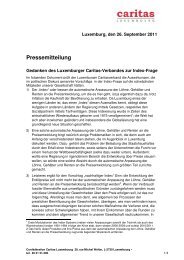Sozialalmanach - Caritas Luxembourg
Sozialalmanach - Caritas Luxembourg
Sozialalmanach - Caritas Luxembourg
You also want an ePaper? Increase the reach of your titles
YUMPU automatically turns print PDFs into web optimized ePapers that Google loves.
ideological strife and polarising advocacy coalitions does nothing to move the policy<br />
discussion towards better understanding or more effective policy solutions and economic<br />
governance. Moreover, models come and go. There is no ‘one best way’: institutional<br />
designs that underpin market economies will differ according to domestic and regional<br />
preferences and needs.<br />
7. Europe at a Crossroads<br />
Political factors play a key independent role in the selection of policy responses and<br />
domestic institutional adjustments. Previous crisis episodes have revealed how hard times<br />
exacerbate existing tensions, invariably decreasing satisfaction with existing governments.<br />
If the crisis results in an extended period of high unemployment, the voting public may<br />
grow disenchanted with the prevailing policy regime, which they identify with economic<br />
liberalisation. Facing the likelihood of relatively low growth, the key challenge that political<br />
leaders will face is therefore not so much how to manage growth, but how to manage expectations.<br />
Even before the economic crisis there was no evidence that citizens were shifting<br />
allegiances away from the nation-state. In Europe, the 2005 referenda on ratification of the<br />
European constitution demonstrated the strength of nationalism. Various public opinion<br />
polls overwhelmingly reaffirmed that citizens held their national governments accountable<br />
for their security and wellbeing, and felt betrayed by the globalising ambitions of the EU.<br />
The economic crisis intensified these sentiments, thus bringing the centrality of the role<br />
of the nation-state back into the limelight. The European welfare state, following this line<br />
of reasoning, was introduced as a way of re-establishing this legitimacy and rebuilding the<br />
capacities of the state. Whereas in good times the hand of the state may have been hidden,<br />
in hard times it re-emerged visibly and powerfully.<br />
A new welfare edifice custom-tailored to the realities of economic internationalization,<br />
post-industrial social change, post-crisis austerity, and intensified European integration is<br />
needed. Is the new social policy agenda – the social investment paradigm – the best safeguard<br />
for social progress, delivering on the promise of equality of opportunity, in combination<br />
with a strong commitment to basic social citizenship? Will the strong emphasis on social<br />
promotion in the recent literature produce a satisfactory response to the current global<br />
economic downturn? Or, should traditional social protection come back into the equation?<br />
The need for resilient employment and social policy is greater than ever today. Now<br />
is the time to modernize social services, safeguard pensions, and narrow the gap between<br />
rich and poor, while simultaneously consolidating state revenue. This precarious juncture,<br />
as we teeter on the verge of recession, creates a number of policy temptations. There is the<br />
obvious temptation of completely abandoning fiscal discipline to save jobs and maintain,<br />
as much as possible, the welfare status quo. Strengthening the social dimension of domestic<br />
172








